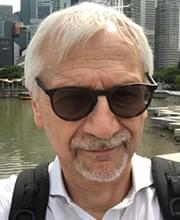
Ahead of this September's Food Contact Asia 2022, we spoke with Dr Dario Dainelli, Owner & Managing Director at Dario Dainelli-Policy & Regulatory Affairs, to get a sneak peek of what we can expect from his presentation on 'Promoting circular plastics in the Asian Countries'. Here's what he had to say...
Current Industry Focus:
Q1. As consumers/end users continually push for more sustainable/greener/safer solutions, what do you think is the biggest concern regarding food contact materials/packaging?
Without prejudice of the continuous efforts made to produce more environmentally friendly solutions, it is important to communicate the value of the existing food packaging solutions, that are intrinsically sustainable insofar they avoid spoilage of food. Food spoilage has a far higher impact on the environment, because of the enormous wastage of resources, than the production of packaging materials. This does not mean that we shouldn't strive for more recycling, more reuse and better packaging solutions, but communicating the value to consumers and legislators is at least as important as continuing to innovate
Q2. What are some of the biggest opportunities gaining attention within the food contact field? How has your company chosen to react/adapt to stay on trend?
I believe that the biggest opportunity for today's business in food contact is represented by plastics recycling. The technologies of sorting and recycling have evolved dramatically in the last 5 --10 years , and the quality of the recycled materials has greatly improved. Historically PET bottles led the market of recycled plastics in many jurisdictions across the world. This is expanding further: India and Thailand have recently approved schemes for bottle-to-bottle recycling, and we hope that China will take that decision soon. Many jurisdictions have established targets for recycling plastics, and food contact applications are instrumental to reach these targets. Our company is helping businesses to produce high quality recycled materials, and get them approved for food contact applications virtually in all jurisdictions across the world
Future Focus:
Q3. What industry topics are getting the most attention at this time? How are these factors influencing the future of food contact packaging/materials?
Sustainability, whether driven by regulatory authorities or by consumers, is a key business driver for the future, and there will certainly be more and more changes and evolution in the food contact industry to meet this challenge. It is important that the evolution towards more sustainable materials goes hand-in-hand with the highest standard of safety. This is an aspect that should not be overlooked: the very high standard of safety achieved by the food contact industry should be maintained in the evolution and innovation processes. Also, the regulatory authorities should make sure that the push they exert for adopting more sustainable food contact materials is balanced against the safety needs
Q4. What does your company/organization hope to achieve over the next 5 years with regards to the future of food contact packaging/materials industry?
Our Company is a small player , with high technology and regulatory skillset. We compete with bigger consulting companies and with law firms, our strength is the perfect mix of expertise between technology knowledge and legal background. Unlike many legal firms, we have direct experience of manufacturing, converting and application processes ,and unlike many purely analytical consulting firms, we have built an extraordinary legal and regulatory background.
We strive to become the most reputed partner to food and fod contact business operators in Europe by 2030, maintaining and improving the growth rate that we have achieved in the last 3 years. We have established a strategic partnership with the Kasetsart University in Bangkok through which we provide support to clients in the Asia-Pacific Region. We will strengthen the collaboration with the arrival of a new partner in 2022.
Q5. What opportunities are there for harmonization of food contact regulations in the Asia Pacific region?
Harmonization is a rather difficult concept: despite many years of food contact regulations, harmonization has not been achieved even in Europe. In some areas where commercial agreements already exist, e.g. ASEAN, harmonization is much easier. What it may be done instead is to use internationally consolidated standards and criteria to rule substances and new and existing technologies, providing a background on which these substances and technologies can be assessed. For example, risk assessment criteria for virgin and recycled materials, testing protocols, potential restrictions are all areas in which common criteria may be adopted.
Conference Related:
Q6. Your presentation at this year’s event is Promoting circular plastics in the Asian Countries. Why is it important for others in your industry to hear this message? What are some of the key take-aways?
I firmly believe that recycling is a breakthrough in plastics technology, and represents the future of the plastics business. It is a growing topic, fastly expanding, with enormous potential and very positive impact on the environment. Used plastics can become a resource rather than a problem in Asian Countries, and we would be very glad to contribute to this process. I think industry in general is very well aware of the potential, but sometimes it misses the tool to turn the potential in practice; we are offering our support to make the transition to circular plastics in Asia a reality.
Q7. Which presentations (what session topic) are you most looking forward to hearing about at Food Contact Asia?
This is a good question. Basically I am interested in all of them, but in particular the contributions that are backing up measures for the introduction of recycling legislation in China is certainly of high interest.
